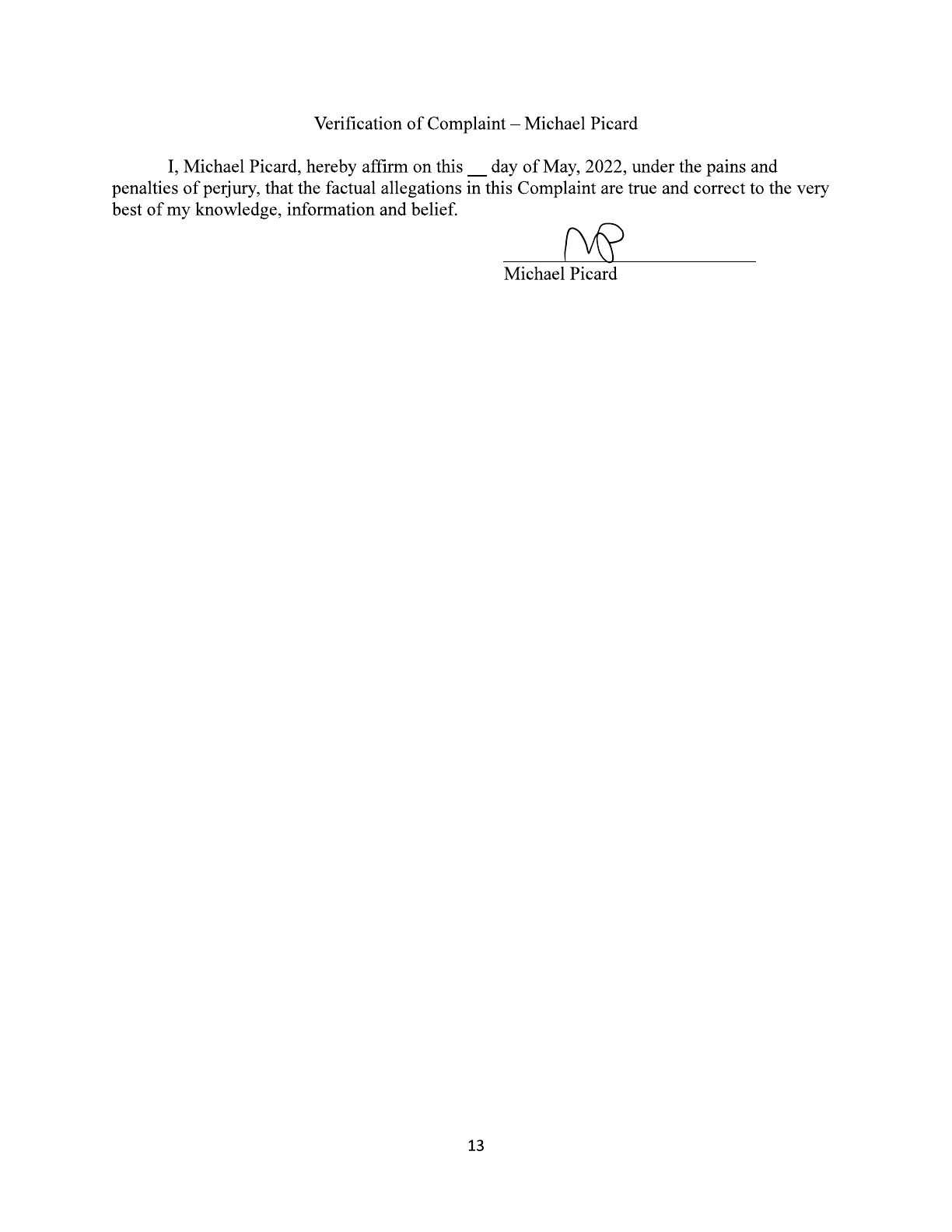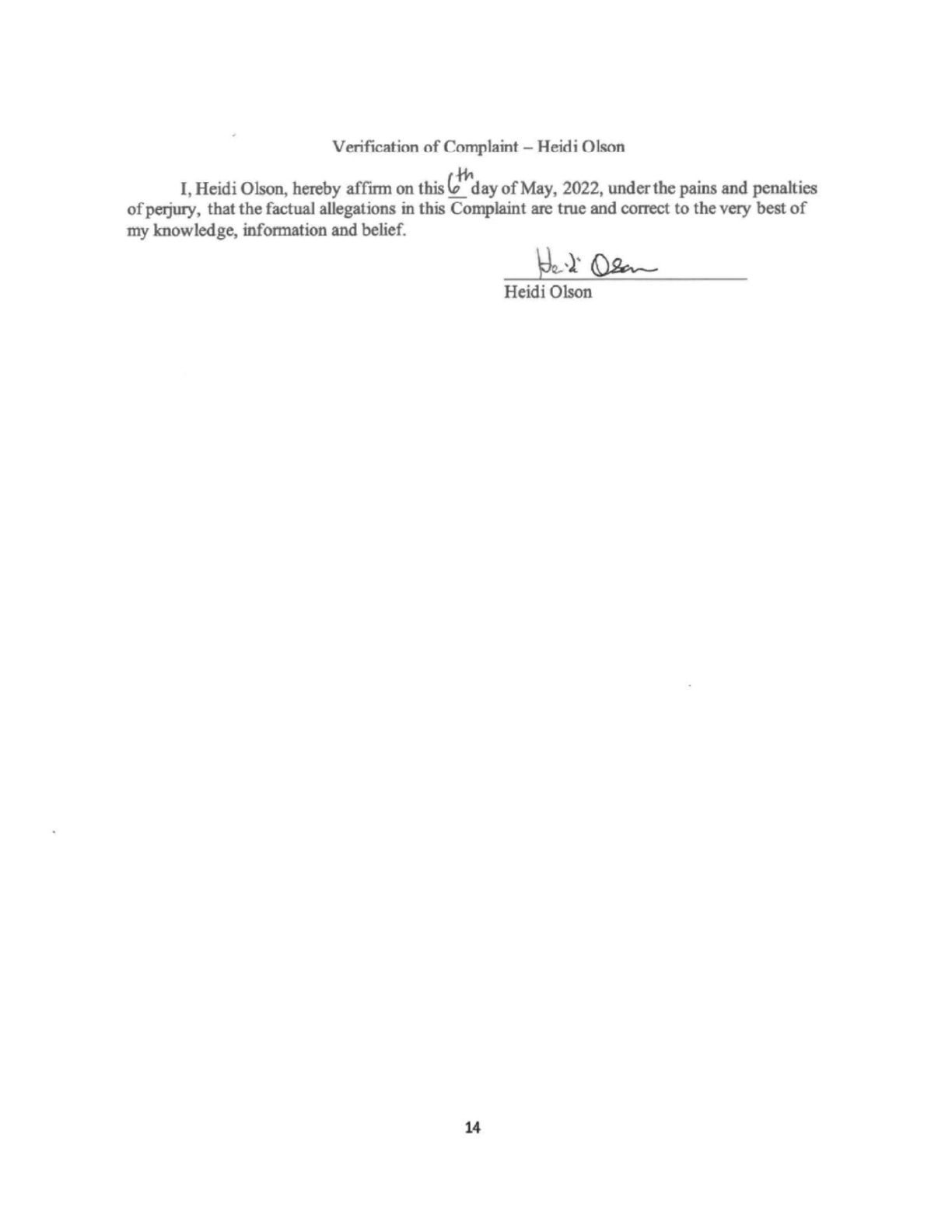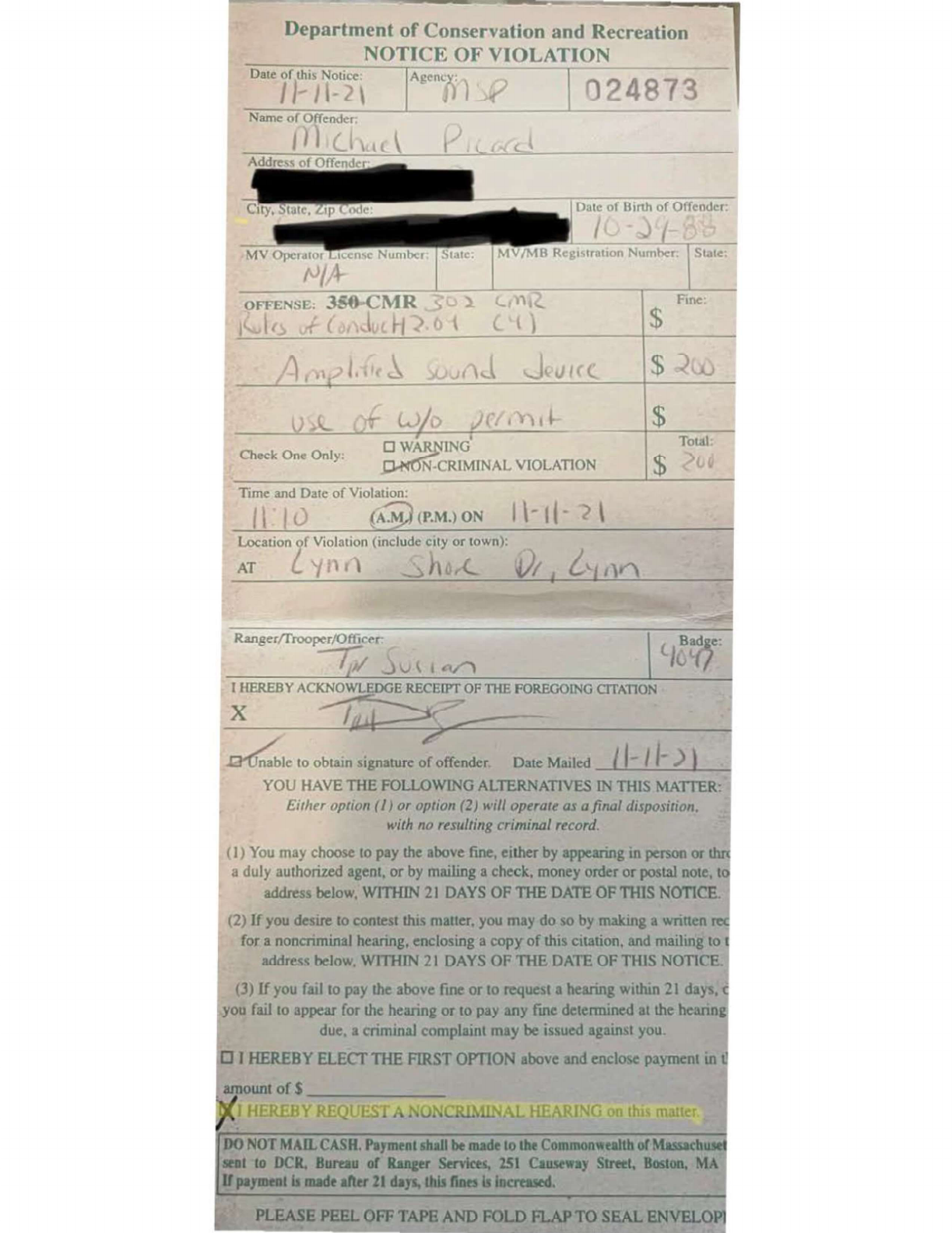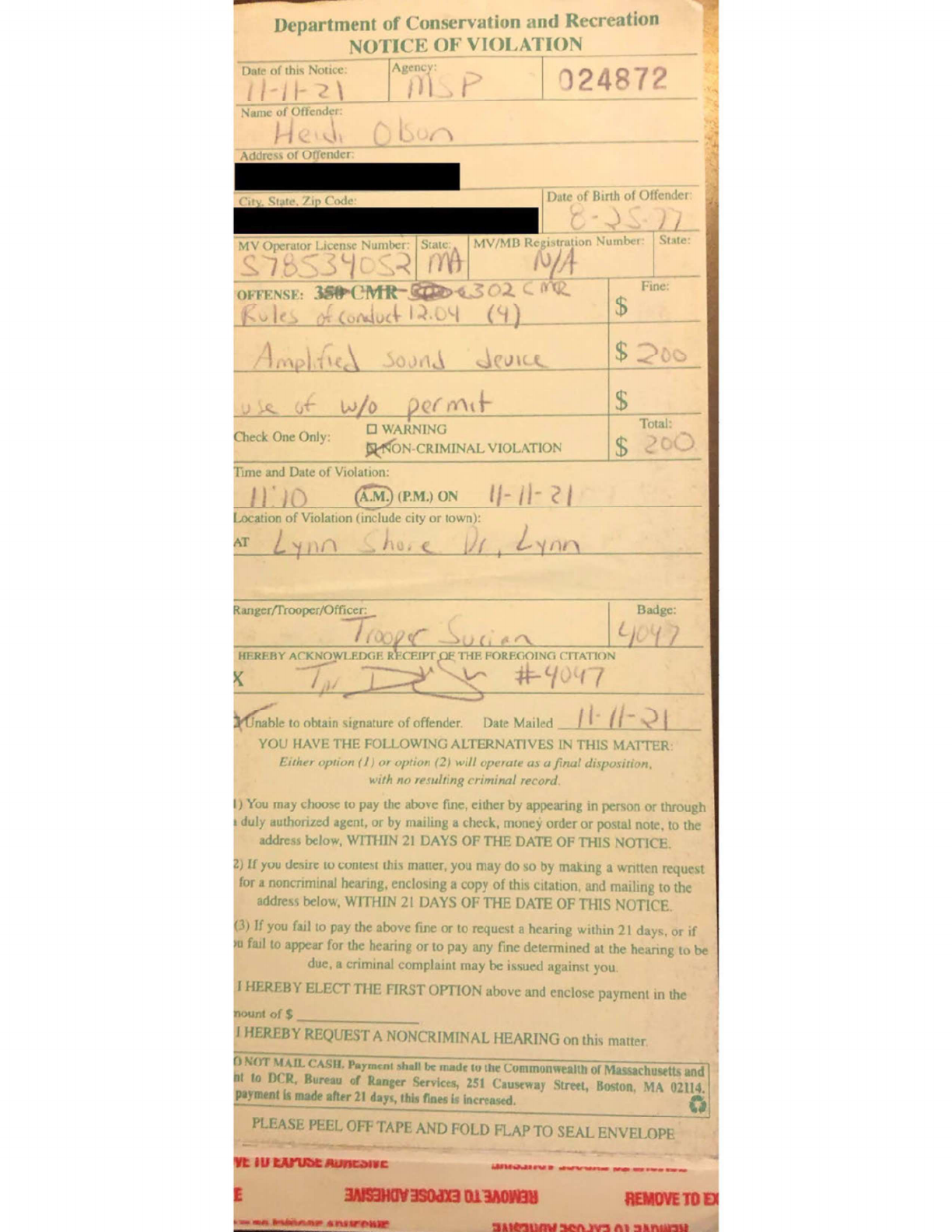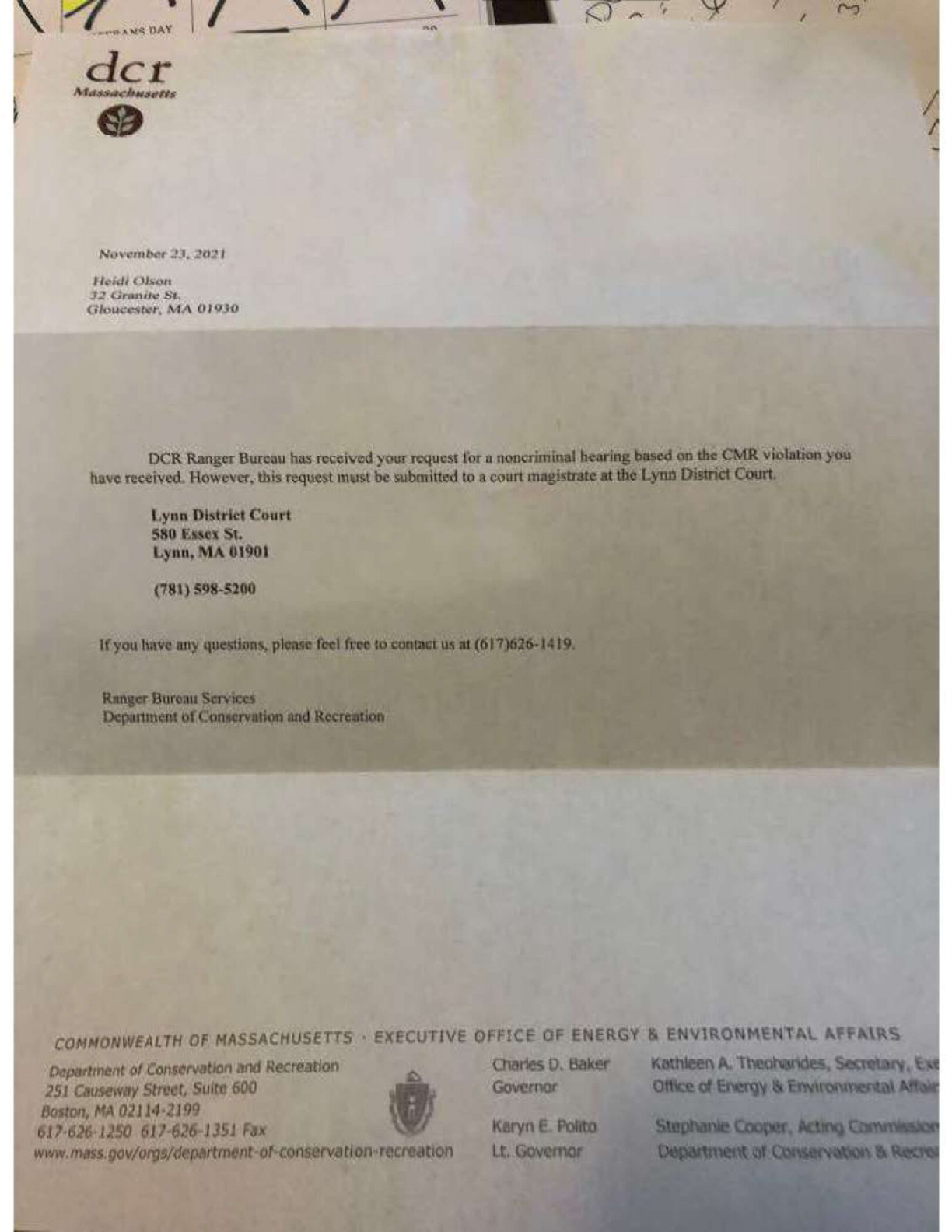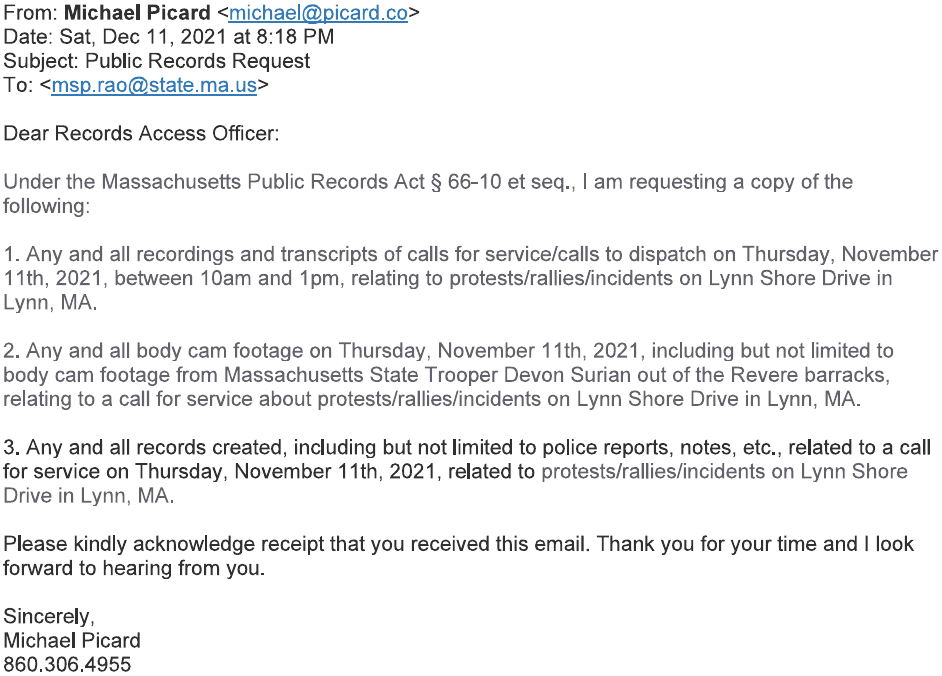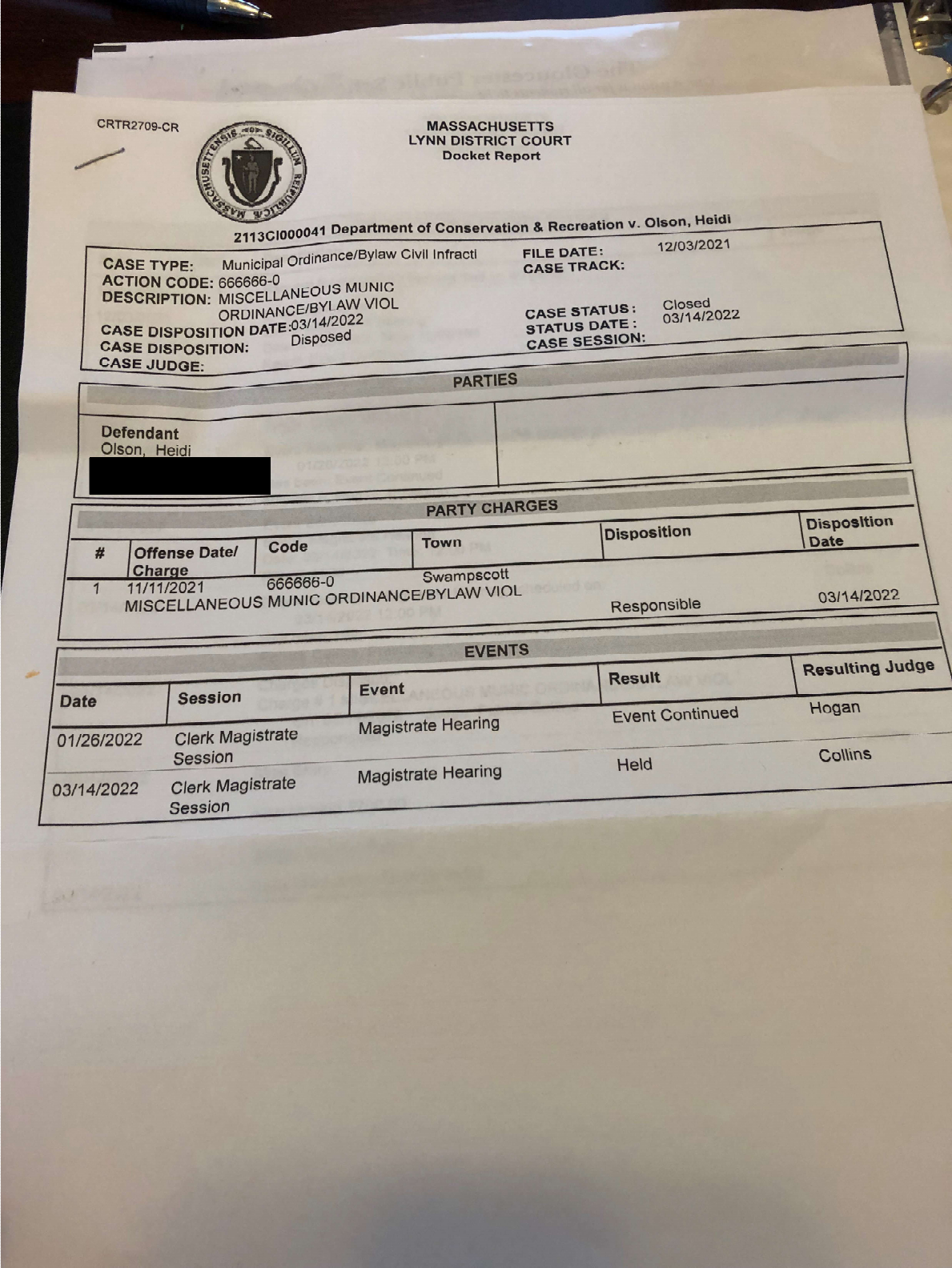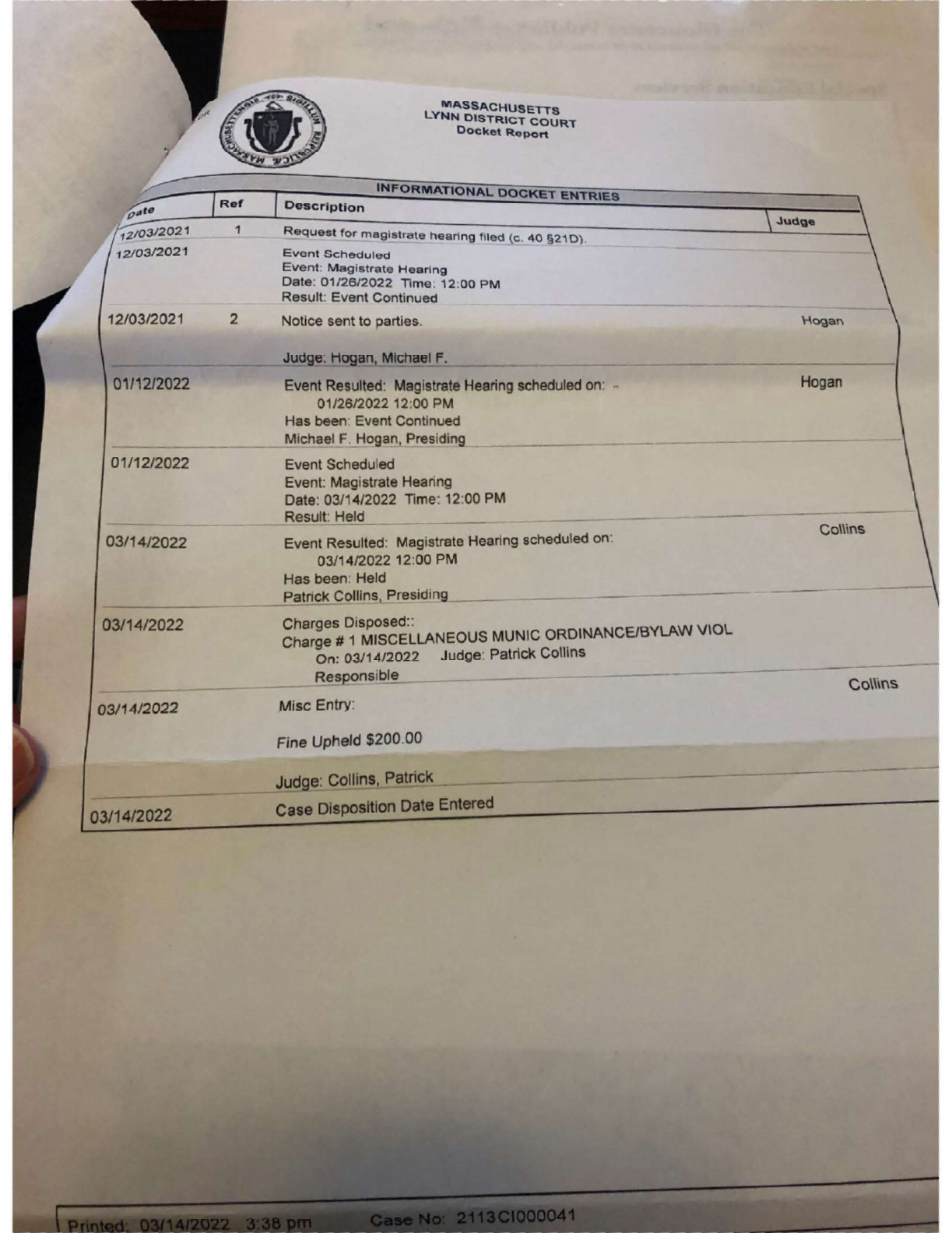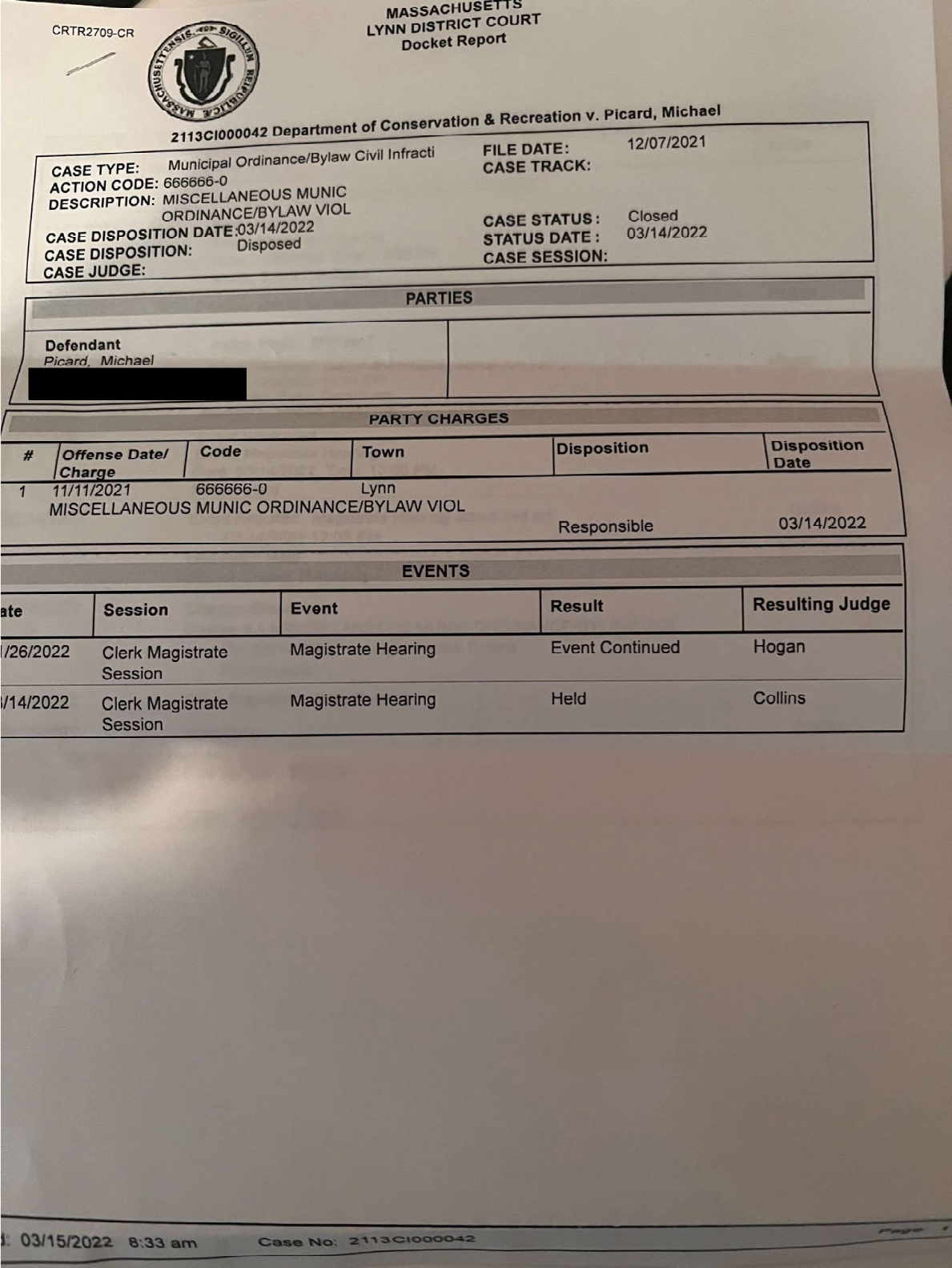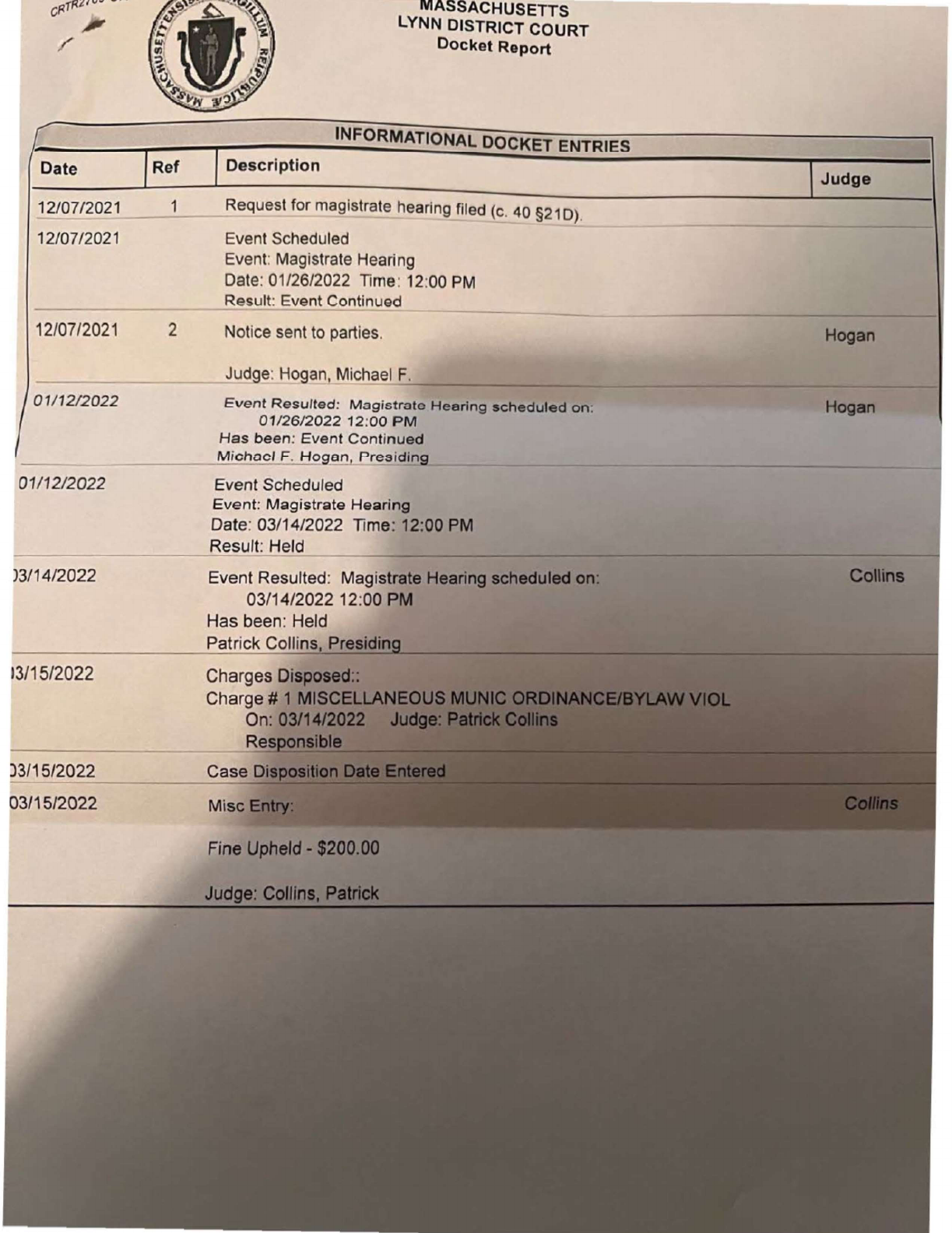1
COMMONWEALTH OF MASSACHUSETTS
SUFFOLK, SS. SUPERIOR COURT
CIVIL ACTION NO.
____________________________________
)
MICHAEL PICARD and HEIDI OLSON, )
Plaintiff, )
)
v. )
)
MASSACHUSETTS DEPARTMENT OF )
CONSERVATION AND RECREATION, )
MASSACHUSETTS )
STATE POLICE, and )
DEVON SURIAN, in his capacity as a )
Massachusetts State Police Trooper and )
in his individual capacity, )
Defendants. )
____________________________________)
VERIFIED COMPLAINT FOR DECLARATORY AND INJUNCTIVE RELIEF
AND RELIEF IN THE NATURE OF CERTIORARI
INTRODUCTION
1. This is a civil rights action challenging the constitutionality of Department of Conservation
and Recreation (“DCR”) regulations that unlawfully restrict rights to free speech and
expression on public lands and that were applied to Plaintiffs on November 11, 2021.
2. On November 11, 2021, Plaintiffs engaged in a peaceful counter-protest in support of gay
rights in response to a demonstration in Lynn, Massachusetts involving at least one person
who had previously made statements in public and posted them on-line that Plaintiffs
perceived as homophobic.
3. Plaintiffs’ counter-protest was completely peaceful and consisted primarily of holding a sign
saying: “Let’s Make Everybody Gay,” soliciting signatures for petitions in support of gay
rights, and advocating for a Pride Flag to be hung along with other flags being erected by the

2
demonstrators on the seawall. At times, Plaintiffs used bullhorns to ensure their voices could
be heard.
4. In response to this peaceful and satirical counter-protest, Massachusetts State Police (“MSP”)
Trooper Surian ordered Plaintiffs to stop using bullhorns and to leave DCR property and then
issued citations against them. DCR then failed to provide Plaintiffs the due process required
under its regulations to challenge citations for conduct on DCR-operated property.
5. Plaintiffs seek declaratory and injunctive relief as to the constitutionality of the DCR
regulations on which the citations and Trooper Surian’s actions against them were based, the
legality of Defendant Surian’s actions against them on November 11, 2021, DCR’s failure to
afford Plaintiffs the administrative hearing process required by law, and MSP’s failure to
respond timely to a related public records request.
PARTIES
6. Plaintiff Michael Picard resides in South Windsor in Hartford County, Connecticut.
7. Plaintiff Heidi Olson resides in Gloucester, in Essex County, Massachusetts.
8. Defendant the Department of Conservation and Recreation (“DCR”) is an agency of the
Commonwealth of Massachusetts with headquarters in Suffolk County, Massachusetts. It is
responsible for management of the Lynn Shore Reservation and the property on which the
events of November 11, 2021 occurred.
9. Defendant the Massachusetts State Police (“MSP”) is an agency of the Commonwealth of
Massachusetts with headquarters in Middlesex County, Massachusetts and a barracks in
Suffolk County, Massachusetts to which, upon information and belief, Trooper Surian is
assigned. MSP provides policing services on DCR-managed properties, including the Lynn
Shore Reservation.
3
10. Defendant Devon Surian is an officer/Trooper employed by MSP, assigned to the MSP
Revere, Massachusetts barracks, and who resides in Suffolk County, Massachusetts.
11. This Court is an appropriate venue for this action challenging the regulations and actions of a
division of the state, pursuant to G.L. c. 223, § 1 and G.L. c. 66, § 10A(c) and because
DCR’s headquarters and the MSP barracks to which Trooper Surian is assigned are in
Suffolk County.
FACTS
The Counter-Protest
12. On November 11, 2021, a group of people staged a demonstration near a sidewalk along
Lynn Shore Drive in Lynn, Massachusetts, on public property that is managed by DCR.
13. These demonstrators included individuals who regularly demonstrate in the area, including in
support of former President Trump and in opposition to President Biden (including by calling
out to passersby “fuck Joe Biden”). On November 11, 2021, they affixed flags to the sea wall
that runs alongside the water and next to the sidewalk that is part of the Reservation. The
flags contained messages supporting former President Trump, U.S. troops, and gun rights.
14. Plaintiffs knew that one or more of these demonstrators had previously participated in
demonstrations in which they expressed views that Plaintiffs considered homophobic and
offensive, including with regard to an LBGTQ+ flag flown at Swampscott Town Hall. For
instance, a few days before November 11, the organizer of the November 11 demonstrators
called out to someone displaying the LGBTQ+ Pride Flag that they were “trying to make
everybody gay” and to “make the kids gay.” She called out to someone “take down the gay
flag, faggot.” Based on her own social media postings, a few days before that, she told a
passerby who objected to her comments that he was a “stupid, faggot,” that she had pepper
4
spray and yelled “do you want it?” and told him to “tell them to take down the gay pride flag,
faggot.” In addition, this same person posted footage of herself apparently on a different day,
in which, after taunting young boys at a school in Swampscott who did not want to talk to
her; she said that the schools were trying to turn boys into “girls, fags, gay.”
15. On November 11, 2021, Plaintiffs arrived together at the location of the demonstration to
counter-protest this group of demonstrators.
16. Plaintiff Michael Picard carried a handmade sign saying, “Let’s Make Everybody Gay.” He
politely greeted the organizer who had made the anti-gay comments referenced above. He
asked her if she would support a petition to put LGBTQ flags every 20 feet in Swampscott
and Lynn. In response, she threatened to pepper spray him as shown on her own recording of
the event. At times, he asked people if they wanted to sign a petition in support of gay rights.
17. Plaintiff Heidi Olson asked the demonstrators to put up a pro-LGBTQ+ “Pride” flag and
called for passers-by to encourage them to do so.
18. Plaintiffs each maintained distance between themselves and the other demonstrators and
periodically used bullhorns that were not discernably louder than the voices of the
demonstrators. They did not impede anyone’s passage on the public sidewalks or grass. They
were calm and pleasant in the face of anger coming from some of those they were counter-
protesting.
19. Soon after Plaintiffs arrived, at least one of the demonstrators used a bullhorn, including to
amplify the sound of a siren directed at Plaintiffs
.
20. Upon information and belief, one of the original demonstrators called the police in response
to Plaintiffs’ presence. MSP officers, led by Defendant Surian, soon arrived and began
talking to participants.
5
21. Defendant Surian first told Plaintiffs they could not use bullhorns without a permit, which
they promptly agreed to stop using.
22. Defendant Surian then told Plaintiffs they had to leave the area entirely because they did not
have a permit. At one point, he also told the original demonstrators that they could not protest
on DCR property without a permit but then allowed them to remain for over an hour.
23. Defendant Surian then told Plaintiffs they were not free to leave until they provided their
names and contact information in conjunction with using the bullhorns.
24. During these interactions, Defendant Surian told one of the demonstrators that he knew the
Plaintiffs were engaging in conduct that was “inciting”—presumably referring to the fact
they were engaging in a counter-protest that the demonstrators did not appreciate.
25. After Plaintiff Picard left the area and returned, Defendant Surian told him that if he did not
leave the area, he would issue another citation against him.
Prior Proceedings
26. A few days after November 11, Plaintiffs received citations in the mail for allegedly violating
the Regulation for “amplified sound device use of w/o a permit.” (sic). See Exhibit A (Picard
citation) and Exhibit B (Olson citation) (home addresses redacted).
27. Two DCR regulations (302 CMR 12.04(28)(e) (the Audio Device Regulation), and 302 CMR
12.04(28)(f) ( the Public Address System Regulation)), require advance special permits on
public lands for use of certain “audio devices” or “public address systems” with no objective
standards to guide enforcement discretion and which do not clearly apply to mere bullhorns.
28. These regulations were not cited in the citations Plaintiffs received. The only regulation cited
in each citation was the Disorderly Conduct Regulation (302 CMR 12.04(4)).
6
29. 302 CMR 12.04(4) prohibits “disorderly conduct” on DCR-operated public properties, which
is defined to include “unnecessary noise offensive to the general public” (with no objective
standards to guide enforcement), as well as “use of profanity, vulgar or obscene language, or
other language that may incite fighting or harm to DCR personnel or to the public.”
30. Each citation was on a DCR citation form and indicated each Plaintiff was being fined $200
for the asserted violation.
31. Each citation also said: “If you desire to contest this matter, you may do so by making a
written request for a noncriminal hearing, enclosing a copy of this citation, and mailing to the
address below WITHIN 21 DAYS OF THE DATE OF THIS NOTICE.”
32. Upon information and belief, neither the demonstrator who threatened to pepper spray
Plaintiff Picard nor the demonstrator who used a bullhorn were cited for their conduct.
33. Plaintiff Olson requested a hearing from DCR by promptly sending a request to DCR in the
pre-addressed envelope that came with the citation. On November 23, 2021, Ms. Olson
received a letter from DCR informing her that her only avenue for challenging the citation
(and purportedly avoiding criminal prosecution) was to seek relief from the Lynn District
Court. Exhibit C.
34. Contrary to the DCR letter, pursuant to 302 CMR 12.21 “A party who is aggrieved by a DCR
decision may appeal such decision in writing within 30 days. Appeals to DCR decisions will
be conducted in accordance with M.G.L. c.30A and the regulatory provisions found at 801
CMR 1.00: Standard Adjudicatory Rules of Practice and Procedure.”
35. In reliance on DCR’s communication, both Plaintiffs sent materials to the Lynn District
Court saying they wanted to appeal their citations. In response, hearings were scheduled by
7
the court pursuant to G.L. c. 40, § 21D, even though on its face that statute applies only to
actions taken pursuant to municipal laws, not regulations of state agencies.
36. On December 11, 2021, Plaintiff Picard submitted a public records request to the Public
Records Officer at MSP, seeking all records and recordings related to the November 11,
2021, incident. A copy of that request is attached as Exhibit D. He never received any
response, let alone within 10 business days, in violation of G.L. c. 66, § 10.
37. As a result of MSP’s failure to comply with the public records law, Plaintiffs did not have
access to the police report(s) and other documents related to their citations, which hampered
their ability to prepare for the appeals of their citations.
38. On March 14, 2022, purportedly pursuant to G.L. c. 40, § 21D, a proceeding was held by a
clerk magistrate in the Lynn District Court as to the citations against both Plaintiffs. Both
Plaintiffs submitted arguments for why the citations could not lawfully be sustained, but the
clerk magistrate nonetheless purported to uphold them. Exhibit E (Olson) and Exhibit F
(Picard) (Plaintiffs’ home addresses redacted). Upon information and belief, no application
for issuance of a complaint against either plaintiff pursuant to the seventh paragraph of G.L.
c. 40, § 21D has been made by DCR or MSP, but the threat of further enforcement action
remains.
39. On March 30, 2022, counsel for Plaintiff Picard alerted counsel for MSP to the issue of
MSP’s failure to respond to Mr. Picard’s public records request. To date, MSP has still not
produced any of the documents responsive to the December 11, 2021 public records request.
40. Both Plaintiff Olson and Plaintiff Picard intend to protest and/or counter-protest in the future
on DCR-operated property. They fear their free speech and due process rights will again be
8
curtailed as a result of the challenged regulations and processes applied to them in connection
with their November 11, 2021 counter-protest.
CAUSES OF ACTION
COUNT 1 – Free Speech and Expression
Article 16 of the Declaration of Rights and First Amendment to the U.S. Constitution
41. The foregoing allegations are incorporated herein.
42. The Disorderly Conduct Regulation is unconstitutional on its face because it is content-
based, not narrowly tailored to achieve a significant or compelling governmental interest, is
overly broad, and does not contain standards to guide discretion or give adequate notice of
what is proscribed.
43. The Audio Device and Public Address System Regulations are unconstitutional prior
restraints on speech that cannot be justified, and are facially unconstitutional because they are
are overly broad, are not narrowly tailored to achieve a significant governmental interest, and
do not contain standards to guide permitting discretion or give adequate notice of what is
proscribed.
44. Trooper Surian’s actions on November 11, 2021, with regard to the Plaintiffs (including but
not limited to the order to cease using bullhorns and the order to leave the area) and the
issuance of the citations against Plaintiffs are unconstitutional applications of the
Regulations.
45. The Disorderly Conduct Regulation, the Audio Device Regulation, and the Public Address
System Regulation, facially and as applied to Plaintiffs, violate Article 16 of the Declaration
of Rights, as amended, and the First Amendment to the U.S. Constitution.
9
COUNT 2 – Due Process
Article 10 of the Declaration of Rights and Fourteenth Amendment to U.S. Constitution
46. The foregoing allegations are incorporated herein.
47. The Disorderly Conduct Regulation, the Audio Device Regulation, and the Public Address
System Regulation are unconstitutionally vague on their face because they fail to give
sufficiently clear notice to those potentially subject to them as to what is prohibited, and fail
to provide sufficient standards to guide enforcement or permit-granting discretion,
particularly with regard to matters of free expression.
48. The Regulations failed to give Plaintiffs sufficient notice that their conduct on November 11
was unlawful and therefore are unconstitutionally vague as applied to Plaintiffs.
49. The actions of Trooper Surian and the citations, which rely on the challenged regulations, are
unconstitutional violations of Article 10 and the Fourteenth Amendment.
50. In addition to the foregoing, DCR has denied Plaintiffs the process they are due by failing to
afford them an adjudicatory hearing as required by 302 CMR 12.21 and instead directing
them to challenge the citations in district court pursuant to an inapplicable statute.
COUNT 3– DCR failure to follow its own regulations
Certiorari – G.L. c. 249, § 4
51. The foregoing allegations are incorporated herein.
52. 302 CMR 12.21 provides that “[a] party who is aggrieved by a DCR decision may appeal
such decision in writing within 30 days. Appeals to DCR decisions will be conducted in
accordance with M.G.L. c. 30A and the regulatory provisions found at 801 CMR 1.00:
Standard Adjudicatory Rules of Practice and Procedure.”
53. In spite of this language, DCR denied Plaintiffs the right to a DCR adjudicatory hearing and
instead indicated their only avenue to appeal was through the district court pursuant to G.L.
10
c. 40, § 21D, even though on its face G.L. c. 40, § 21D does not apply to citations issued
pursuant to state laws or state agency regulations.
54. DCR’s failure to comply with its own regulations is unlawful.
COUNT 4 – Massachusetts Civil Rights Act
G.L. c. 12, § 11I
(as to Trooper Surian in his official and individual capacities)
55. The foregoing allegations are incorporated herein.
56. By his conduct on November 11, 2021 at the Lynn Parkway, and in issuing the citations
against Plaintiffs, Trooper Surian interfered and/or attempted to interfere with Plaintiffs
rights to free speech and due process, protected by Articles 16 and 10 of the Declaration of
Rights and the First and Fourteenth Amendments to the U.S. Constitution by means of
threats, intimidation or coercion, including by explicitly and/or implicitly threatening to cite
and/or arrest them if they did not cease their expressive activities, provide their names and
addresses, and leave the public lands on which they were lawfully present.
COUNT 5 – Massachusetts Public Records Law
G.L. c. 66, § 10A(c)
(as to MSP)
57. The foregoing allegations are incorporated herein.
58. Plaintiff Picard made a valid public records request pursuant to G.L. c. 66, § 10.
59. MSP failed to respond to that request as required by law within 10 business days of
Plaintiff’s request.
Prayers for Relief
Plaintiffs Michael Picard and Heidi Olson hereby request the following relief:
1. A temporary restraining order directing Defendants to take no further action to enforce or
collect the $200 fines purportedly levied against Plaintiffs, including but not limited to any
11
action to initiate criminal process in connection with the fines or any further action
contemplated by G.L. c. 40, § 21D, pending resolution of this litigation;
2. Issuance, after specific request by counsel for Plaintiffs, of a short order of notice as to
Plaintiffs’ request for a Preliminary Injunction;
3. After hearing, issuance of a Preliminary Injunction against Defendants taking any further
efforts to enforce or collect the $200 fines against Plaintiffs, and against continued
enforcement of the Disorderly Conduct Regulation, the Audio Device Regulation and/or the
Public Address System Regulation against Plaintiffs, with regard to free speech/expressive
activities, pending resolution of this litigation;
4. A Declaration that the Disorderly Conduct Regulation, the Audio Device Regulation and the
Public Address System Regulations are facially unconstitutional with regard to expressive
activities, and unconstitutional as applied to Plaintiffs’ conduct on November 11, 2021, both
as a matter of free speech/expression and due process;
5. A Declaration that the November 11th citations cannot be justified by reliance on the Audio
Device or Public Address System Regulations because they were not cited in the citations
given to Plaintiffs;
6. A Declaration that Trooper Surian violated Article 16 and the First Amendment by ordering
Plaintiffs to cease using their bullhorns and to leave public lands on November 11;
7. A Permanent Injunction against Defendants with regard to continued enforcement of the
Disorderly Conduct Regulation, Audio Device Regulation and/or Public Address System
Regulations as to any expressive activities by Plaintiffs;
8. A Declaration that DCR has failed and is failing to meet its obligations under 302 CMR
12.21 by not providing an adjudicatory appeal process as required by that regulation with
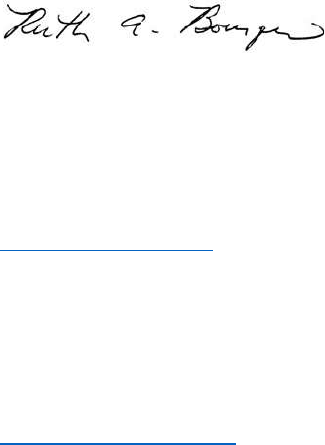
12
regard to appeals of citations, fines and other enforcement actions pursuant to DCR
regulations;
9. A Declaration that the district court did not have in this case, and that the district courts or
other courts of the Commonwealth generally, do not have jurisdiction under G.L. c. 40, §
21D to hear appeals of citations of alleged violations of DCR regulations.
10. A Declaration that Trooper Surian violated the Massachusetts Civil Rights Act by his
conduct toward Plaintiffs on November 11, 2021;
11. A Declaration that MSP failed to comply with the Massachusetts Public Records Law with
regard to Plaintiff Picard’s December 11, 2021 request and as reasserted on his behalf on
March 30, 2022;
12. An award to Plaintiffs’ attorneys of attorneys’ fees and costs pursuant to G.L. c. 12, § 11I,
G.L. c. 66, §10A, and 42 U.S.C. § 1988;
13. Such other and further relief as this Court deems just and proper.
On behalf of Plaintiffs
Michael Picard and Heidi Olson,
___________________________________
Ruth A. Bourquin (BBO #552985)
American Civil Liberties Union Foundation
of Massachusetts, Inc.
One Center Plaza, Suite 801
Boston, MA 02018
617-482-3170 ext. 348
Naomi R. Shatz (BBO #677637)
Zalkind Duncan & Bernstein LLP
65A Atlantic Avenue
Boston, MA 02110
(617) 742-6020
